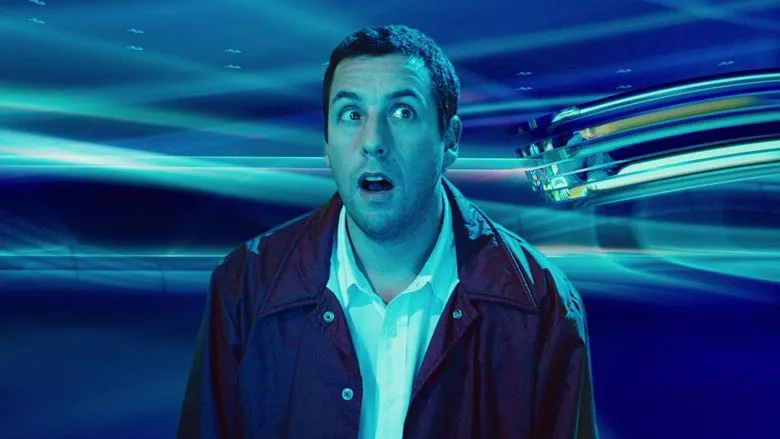“Click”: A Missed Opportunity to Say Something Meaningful
With a budget of $70 million, “Click” (2006) could have explored the idea that time is more than just money, that it’s about family and cherishing moments with loved ones. Instead, the film beats the “family values” theme to death, leaving you wondering if movies are just about logic. Considering it’s directed by Frank Coraci, who even made Jules Verne boring in “Around the World in 80 Days” (2004), and stars Adam Sandler, who seems stuck in a comedic rut, perhaps high expectations were misplaced. The only real changes in “Click” are Kate Beckinsale replacing Drew Barrymore and Christopher Walken sporting a curly wig, neither of which adds much humor.

The humor, as usual, relies on cheap gags, often funnier when involving animals than people. The dogs in the film may change over time, but their obsession remains a yellow plush duck, leading to more exciting scenarios than the marital bed. Ultimately, Coraci manages to make “Click” only mildly unpleasant to watch, which isn’t saying much for a $70 million budget. The real problem is the ending, which is overdone and reminiscent of the Soviet-era film “Escape of Mr. McKinley,” a movie that was nauseating even back then. While the Soviet film used Donatas Banionis to promote anti-American sentiment, “Click” uses Sandler to promote a sanitized version of American life, with its “home, sweet home” ideals. But this “home” can be just as sickening as the old Soviet propaganda.
The Perils of Fast-Forwarding Life
Michael Newman, an architect, seemingly has it all: a beautiful house, car, wife, adorable kids, a fun dog, and parents who live separately. His only problem? He never has enough time, thanks to his demanding job and an overwhelming number of remote controls. Frustrated by the constant juggling act, he seeks a universal remote. This is where the plot becomes predictable. He stumbles upon a “magical” remote from Christopher Walken that allows him to control time.
A Remote Control for Life
He quickly learns to use the remote, pausing his wife during arguments, reliving his childhood, and fast-forwarding through mundane tasks. Like a diligent student, he masters all the remote’s functions, skipping ahead days, years, even decades. He achieves professional success, but his children grow up without him, his wife leaves, his dog dies, and his life slips away. Is it really a surprise that it was all a dream?

Newman never considers slowing down to appreciate life’s moments, despite being an architect. Perhaps that’s why David Hasselhoff didn’t make him a partner. The idea that one can live life on autopilot, as most people do, never crosses his mind. But why give such a powerful tool to someone so clueless? The film becomes increasingly preachy, erasing any humor, and the emotional moments, like the dog’s death, feel forced. Screenwriters Steve Koren and Mark O’Keefe should have stuck to their previous “life lesson” film, “Bruce Almighty” (2003). “Click” is as different from “Eternal Sunshine of the Spotless Mind” (2004) as Sandler’s “Click” is from “Little Nicky” (2000), when Quentin Tarantino would make cameos and life wasn’t yet fast-forwarded.